|
2/17/2014 The Stigma Surrounding Dating ViolenceBy Christine Murray, See the Triumph Co-Founder
This February, we’ve been encouraging you to have conversations with the teens in your life about dating violence. We know, though, that these conversations are often very difficult to have. I believe that one of the reasons for this difficulty is stigma. The See the Triumph campaign is based on our research on the stigma surrounding intimate partner violence. We interviewed and surveyed survivors of intimate partner violence, and many of these survivors were involved in dating relationships. What we heard from these survivors was that stigma was often a major part of their experiences, both during their abusive relationships and afterward. Today, I want to share some of the experiences of the survivors in our studies that illustrate the stigma surrounding dating violence. To do this, I pulled out the subset of participants who said that they were in dating relationships or were in committed relationships but not living with their partners when we asked them to describe the highest level of commitment they had in their past abusive relationship. Next week, we’ll run a follow-up post that specifically addresses the isolation that teen dating violence survivors often feel as a part of that stigma. Today, I’ll focus on three other major aspects of stigma--blame, stereotyping, and shame. Blame Many of these participants noted that they were blamed for all or part of the abuse they experienced. One major source of this blame was the perpetrators themselves. For example, one participant said, “Each time I was abused, he would apologize after and say something along the lines of ‘I'm so sorry, I didn't mean to hurt you. It's just that when you do X, it really makes me mad and you should know that by now.’ I was blamed for everything and believed it was my fault, that was so difficult that I could actually push someone to beat me.” The blame often comes from other sources, too. One woman said this about her friends: “I was called a ‘slut’ and an attention-seeker by my friends. I was told I deserved it and it was my fault my boyfriend was sexually abusing and raping me. I was shunned by them, because he spread lies about me and they believed him over me.” Another participant said that her family blamed her: “My family was understanding at first but then wouldn't understand why I went back to him. After that they would be like ‘This is it. You're on your own. You're stupid for going back.’” Stereotyping Stereotyping is another major part of the stigma surrounding intimate partner violence. This means that people often hold images in their minds about what defines an abusive relationship and who abusers and victims are. Some of the experiences of our study participants illustrate how these stereotypes can prevent survivors from getting the support and resources they need. For example, one survivor said, “I feel as if I experienced discrimination and stereotyping by professionals (police officers, counselors) when I tried to get help or sometimes by individuals if I told my story. It's like they had one opinion of me (young, energetic, bright college student) but then when I disclosed the abuse none of that other stuff mattered about me. All they could see was this stereotype of an abused woman.” Another participant internalized these stereotypes: “Stereotypes of what relationship abuse looks like have created a big problem for me, because they prevented me from understanding for a very long time that what I experienced was emotional and sexual abuse. The stereotypes that exist about relationship abuse are still difficult for me, because I worry that admitting I was treated in abusive ways will make me look (and even feel) weak.” These quotes show just how harmful these stereotypes can be for survivors of dating violence. Shame In our research, we’ve come to view shame as blame turned inward. Many survivors have internalized the blame they experienced from others, which can lead to a negative self-perception. The following quotes illustrate just how deeply the shame surrounding dating violence can impact survivors:
All of the above quotes illustrate just how profound the stigma surrounding dating violence can be. Stopping this stigma is a major task, but I believe that continuing to raise awareness about dating violence and other forms of abuse is an important step in the right direction. Awareness is so important, especially for young people. By virtue of their age, young people have very limited relationship experience, and therefore it’s often difficult for them to know what is normal and healthy. For example, one of our study participants said, “I was not aware that was an abusive/violent relationship until I was directed by my advisor to read some articles about dating violence after I told my story to her. (I was just thinking that it is LOVE).” This quote also shows how powerful mentors can be in helping younger people identify unhealthy relationship patterns. We also need to help younger people learn the signs of unhealthy and unsafe relationships. This awareness can’t stop just when teens are entering relationships, because relationships can change, for better or worse, over time. Teen dating relationships often start off in a whirlwind of romance, and abusive patterns may not begin to show up until once the relationship has been established. For example, consider another of our participant’s stories:
2/14/2014 A Message to Teens Who Are DatingBy Christine Murray, See the Triumph Co-Founder
This month at See the Triumph, we’ve been focusing on talking with teens and parents about dating violence. In the process, I’ve spent a lot of time thinking about what I personally wish I would have known at that age about dating and relationships, based on what I know now. As a parent myself--with several years to go before we get to the teen years--I’ve also been thinking about what messages I hope to be able to share with my own kids about dating and relationships as they get closer to that stage of life. And so, today I want to share a message with teens who are starting to think about dating, or who have already begun to so. These messages reflect the lessons I’ve learned through my own relationships, my parenting experiences, my professional training and work experience as a couple and family therapist, and the research I’ve done about intimate partner violence, especially the research that we’ve done for See the Triumph. Before I get into the specific messages, I’ll start by saying that it’s okay and totally expected that you’ll feel a bit nervous and confused when it comes to dating and relationships as a teenager. I can remember when I was that age, I felt that everyone else seemed to have it all figured out, but I know now that most everyone was just as confused as I was! Chances are, your friends and classmates are just as uncertain as you are, even if they look confident and stress-free when it comes to dating. And, I’ll let you in on a little secret: Even adults are often confused when it comes to relationships and understanding their partners! There are a lot of things about relationships that can be confusing, but I feel pretty confident in sharing the following ten messages with you: #1: First and foremost, seek relationships that are full of respect and kindness. One of the first questions I’d suggest you ask yourself about any potential girlfriend or boyfriend is: Is this person kind? You want to be certain that any person you get involved with will treat you with kindness and respect, so think carefully about how they treat you, and be sure that their behaviors reflect kindness and concern for you. Also, think beyond how that person treats you...Are they kind to their peers, in and out of school? Do they show kindness to people they don’t consider to be friends? Do they treat adults with kindness and respect? How do they act toward people like servers at restaurants and workers at stores and other businesses? Kindness alone won’t guarantee that a relationship will work, but a lack of respect and kindness is a pretty good indicator that a relationship either won’t work or won’t be a happy one. #2: Relationships should make you feel better, not worse. There will be difficult times in any relationship. Conflict is a normal part of relationships, and it’s healthy when it’s managed well. So sometimes, you will probably feel some sadness, anger, or frustration with your partner. However, more often than not, your relationship should make you feel good and happy. One of the leading relationship researchers, Dr. John Gottman, has even found a specific ratio of good to bad interactions that leads to a successful relationship: He found that you should aim for 5 positive interactions for every bad one. This means that you should be certain that your relationship makes you feel good and happy much more than it feels upsetting and angry. If you find yourself unhappy with your boyfriend or girlfriend a lot of the time, I suggest it’s time to re-evaluate that relationship. I hope that you’ll believe that it’s better to be in no relationship than it is to be in a relationship that hurts your spirit. Don’t ever let a fear of being alone keep you in an unhealthy or unsafe situation. #3: Don’t let peer pressure overshadow your own intuition. During your teen years, you will almost certainly face some sort of direct or subtle pressure from your peers to make choices that you wouldn’t necessarily choose on your own. Sometimes, this pressure can bring positive things into your life, such as if your friends encourage you to sign up for a fun new activity. But other times, of course, peer pressure can lead you down unhealthy or unsafe paths. Don't let peer pressure overshadow your own intuition when it comes to relationships. Be careful not to let friends pressure you into bad relationships because of popularity or some other perceived status of a potential partner. Just because someone is popular doesn’t mean they’ll necessarily be a good boyfriend or girlfriend to you. Trust your own intuition first when it comes to making decisions that will impact your happiness, your safety, and your future. #4: No form of abuse can be a part of a healthy relationship. I believe strongly that every person has a right to a safe, healthy relationship. Any form of abuse is a barrier to safe and healthy relationships. Abuse can come in many forms, including emotional, physical, and sexual. Examples of emotional abuse include name calling, keeping you away from your friends and family, and controlling what you wear or where you go. Physical abuse includes any form of physical violence, such as hitting, kicking, pushing, and choking. By sexual abuse, I mean forcing you or coercing you to do anything of a sexual nature that you don’t directly consent to do. Some people believe that dating violence only refers to physical abuse. However, emotional and sexual abuse can be just as damaging--if not more--to relationships as physical violence. Any abusive behaviors should be taken seriously. If you ever experience any form of abuse, seek help from a trusted adult or a domestic or sexual violence agency in your community. #5: Abuse could happen to anyone. A lot of people have stereotypes about what kinds of people end up in abusive relationships--either as a victim or a perpetrator. Although certain factors (such as coming from a healthy family background and being involved in positive activities in your school and community) do help, abusive relationships really can and do happen to people from every possible background. The problem is, when people think that abuse doesn’t happen to people like them, they’re probably less likely to realize when they’re experiencing abuse. They may turn a blind eye to abusive behaviors or excuse them, such as if they think, “He comes from a great family, so even though he hits me every now and then, he’s not an abuser.” I encourage anyone who is dating to learn some of the “red flags” of abuse so that you’ll be better able to identify a potentially abusive situation, either for yourself or for a friend. #6: Remember that there’s a thin line between the flattery of attention and controlling behaviors. Early in a dating relationship, some of the signs that a relationship is abusive can easily be confused for affection and positive attention from a partner. If you’re interested in dating someone, you’ll probably feel flattered and excited when they pay attention to you, such as by calling you, asking you about your day, sending you sweet text messages, and learning more about you. I think the early time in a relationship is meant to be enjoyed, and all of these things are a part of that fun and excitement of a new relationship. However, I want you to think about some signs that all this attention might mean your partner could be abusive. Some questions to think about are as follows:
#7: When it comes to dating, take it slow. By taking it slow, I’m not just talking about physically. It takes a long time to get to know someone, and it’s important to think carefully about the people you bring into your life to date. Take the time to really get to know someone, such as learning about their families, their values and hobbies, and their goals for their current life and their future. Think carefully about how well someone would fit into your life and if they’d support your own goals for your life. Even if you already have known someone for a long time before you start dating, you still should take time to get to know them as a dating partner. How someone acts as a friend can be very different from how they act in a relationship. Fill your life with great friendships, fun hobbies, and fulfilling goals, so your life will always feel full enough that you won’t need to rush into an intense relationship to fill a void in your life. #8: Don’t be afraid to ask for help or guidance when you face situations that you’re not comfortable with. Like I said earlier, even adults sometimes feel confused about relationship situations. Relationships are complicated, and there are a lot of challenges that arise as you get to know someone and build a relationship with them. It’s a good idea to have at least one or two close confidants that you can talk with when relationship challenges come up. Try to find someone whose opinion you value who also isn’t likely to be judgmental of you. For many people, it’s not easy to admit to others that you’re struggling. If your partner is doing something you’re not comfortable with or you’re concerned might be unsafe, you might feel embarrassed to tell someone else about it. I know it’s hard, but this embarrassment might actually be a sign that it’s important to tell someone about what you’re going through. If you find yourself hiding or making excuses for your partner’s behavior, you probably realize on some level that what they are doing is wrong. Nobody has all the answers, but talking through difficult relationship challenges is a really helpful way to sort through what is and isn’t normal and healthy, as well as to come up with possible solutions to the challenges you face. #9: Relationships may end. Relationships beginning and ending is a normal part of life. Sometimes, there are problems in a relationship that just can’t be fixed. The decision whether to end a relationship or to try to work on improving it is often a very difficult one. It’s a good idea to remember that your teen years are a time of great change, and you’ll be learning new things and having new experiences all the time that can change you. As you change, you may find that a relationship no longer fits in your life. This is a very normal experience during the teen years. And yet, the end of a relationship can be a very scary and upsetting experience. Sometimes, people hold onto relationships much longer than they want to just because they’re scared to move on. Whenever a relationship ends, whether it’s your choice, your partner’s choice, or you both agree to it, always remind yourself that there are good things ahead of you, and you can create a healthy relationship in your future with someone else. #10: Your early relationships are good practice opportunities for later relationships. You can learn so much from any relationship, whether it lasts forever or just a short time. Even a bad relationship experience can be a good learning experience. You can learn from relationships that don't work out, especially if you take the time after the relationship ends to think through the things about your partner that you liked and didn’t liked, what happened in the relationship that made it better and worse, and what you might want to do differently the next time you’re in a relationship. Think of your early dating experiences as practice, whether or not you’ll end up with your current partner in the long-term. You can use any relationship experiences to practice good communication, problem-solving, and conflict management skills. Becoming better at these skills can help you in any future relationship experiences you will have. I hope this list of messages is helpful to you, but I’m also certain that there are a lot of other important lessons that you’ll learn about relationships through your own experiences. I wish you all the best for your future dating experiences, and I especially hope you’ll find safe, healthy relationships along the way! Please share in the comments section below any other messages you’ve already learned, in hopes that your experiences can help other people, too. By Christine Murray, See the Triumph Co-Founder
Throughout this month, we’re focusing on getting conversations started with teens about dating violence. For the most part, we’ve been focusing on conversations that are preventive, with the intention of starting a conversation and equipping teens with information and resources to support healthy dating relationships. But let’s say you have reason to believe that a teen you know may already be in an unhealthy or unsafe dating relationship. Maybe you’ve noticed one or more “red flags” of abuse, such as those described in the list provided by SafePlace in Austin, Texas. Perhaps you’ve actually witnessed some form of abuse, whether it was physical, sexual, or emotional. Or, you may just have a gut feeling that something isn’t right in this teen’s dating relationship. In any case, you are likely concerned for the teen’s safety and want to reach out to help them. It is very normal to struggle to know what to do and say when you’re concerned someone you know is potentially in an abusive relationship. You may find it helpful to look through some of the resources in our Collection on Resources for Supporting Survivors, especially the list of “5 Ways to Help Someone Who Is Being Abused by an Abusive Partner,” which you’ll also find in that collection. Talking with teens about this can be even more complicated, because they probably have more limited relationship experiences, and therefore they may not have a clear sense of what is normal and healthy in dating relationships. In addition, because teens are so heavily influenced by their peers, they may feel a need to stay with a dating partner due to peer pressure, and they may see unhealthy relationship behaviors among their peers and think that those things are normal. And, of course, teenagers can be very sensitive emotionally and be driven by their feelings of love and infatuation with their dating partners. When I’m training counselors and counseling students on working with victims and survivors of intimate partner violence, one of the main things I try to teach them is to be very careful about not conveying judgment about the victim/survivor and their choices. My clinical experiences have shown me that acting judgmentally is a surefire way to shut someone down and make it less likely they’ll be open to hearing what you have to say. So, when starting these conversations, be sure to do so sensitively and with an attitude of support and empathy for the teen’s situation. Here are some statements you can make to a teen to let him or her know that you’re concerned about their relationship:
Teens may not always be excited or responsive--at least right away--when others raise concerns about their dating relationships. However, it’s important for others to let them know that they have support available, and these conversations may help them to recognize unhealthy patterns in their relationships. By Christine Murray, See the Triumph Co-Founder All this month, we've been encouraging you to talk with the teens in your life about dating violence. Before you start these conversations, it can helpful to take some time to learn more about dating violence. This way, you can go into the conversation with a basic understanding of some of the dynamics and "red flags" of abusive relationships, as well as resources available to help. In addition, once you're talking with the teens you know about dating violence, more questions may come up, and it's helpful to know where you can turn for credible information. We've put together this list of web-sites where you can learn more information about teen dating violence. You can download a pdf file of the web-sites below. What other sites and resources would you recommend to others?
Sometimes, it's hard to know if a relationship is safe or unhealthy, or even abusive. No relationship is perfect. Sometimes, there are clear signs, but in other cases, it's difficult to tell what's normal and what crosses the line to become abusive. We've put together these images to help you recognize some of the signs of abusive and unhealthy relationships, as well as the characteristics of positive, safe, and healthy relationships. First, here are some signs that a dating relationship may be unsafe: And now, here are some characteristics of relationships that are generally safe and healthy: If you think you may be in an unhealthy dating relationship, talk to a trusted adult. You can also contact Loveisrespect.org, which offers a 24/7 hotline you could call. Learn the signs of healthy and unhealthy relationships so that you can recognize them in your own life, and be sure to share them with your friends to help them, too!
By Christine Murray, See the Triumph Co-Founder
As we’ve already discussed this month in our series on “It’s Teen Dating Violence Month -- Let’s Talk!!!,” talking with teens about dating violence can be uncomfortable and scary. It’s hard to know where to start. And so, to continue with our efforts to get you talking with the teens you know about dating violence, today we want to bring you… 5 Un-Cringeworthy Ways to Start a Conversation with Your Teen about Dating Violence If just the thought of trying to start a conversation with your teen about this topic brings up feelings of embarrassment, or you aren’t sure how to start that conversation in a way that won’t feel awkward and threatening, here are some possible ways you might bring up the topic: 1. “Can we talk? As you’ve been starting to think about dating and getting to the age where you’ll be doing that, there are some things that have been on my mind that I’d like to hear your thoughts on.” 2. “I'd like to talk with you about dating. I know it may be a little uncomfortable, but I think it's something important for us to talk about.” 3. “I was reading an article (web-site, etc) about teen dating violence. It had some really interesting points that I'd like to share with you.” 4. “I've heard that teen dating violence is really common today. What have you heard about this?” 5. “I can remember what it was like when I first had a boyfriend/girlfriend (or when my friends first started dating). I was sort of scared and confused about it all. What has this been like for your and/or your friends?” Of course, you can play around with the wording of the above questions, and you may find that one of these conversation starters is a better fit than the others for you and your teen. It’s okay to feel uncomfortable bringing up this subject! But your discomfort need not prevent you from opening this dialogue. What are some other ways that you can think of--or perhaps even have used--to start conversations with teens about dating violence? We’d love to hear your ideas, which can be really helpful to others struggling how best to have these conversations in their own lives! By Sara Forcella, See the Triumph Contributor
For many of us the month of February represents the celebration of love- but did you know that it also represents the celebration of teen dating violence awareness? While we may be aware that Intimate Partner Violence (IPV) is a public health concern, many times we fail to recognize the role that partner abuse plays in relationships among teens. Dating violence is simply a form of IPV that occurs between current or former teenage dating partners. Dating violence can be a complex issue and is not just physical. Dating violence can also include emotional or sexual abuse and stalking. Just because violence is not present during the beginning phases of a relationship doesn’t mean that it won’t appear in the future. Something as simple as jealousy or name-calling can quickly turn into a more volatile, violent kind of relationship. In some cases in which dating violence occurs, adults and peers are unaware, or choose to ignore, that the abuse is taking place. By ignoring the issue, we reinforce the stigmas that are already associated with IPV and allow the abuse to continue. Teen dating violence is a serious issue that has lasting effects. It is imperative that we acknowledge and address the issue, even before it appears. The simple solution is that we start the conversation, and continue to talk to teens about dating violence. Teenagers are at a pivotal age where they begin to develop intimate and possibly long-lasting relationships. Dating violence affects teens in a multitude of ways that go beyond physical or emotional effects. Teens who are in abusive relationships are more likely to struggle in school, engage in drinking and drugs, have disordered eating and continue these abusive tendencies in future intimate relationships (teendvmonth.org). Here is an easy way to begin the conversation- take a look at these statistics regarding teen dating violence… and start talking! Teen Dating Violence Awareness Matters Because:
These statistics show that teen dating violence proliferates our school systems and teenagers’ lives, yet is still underreported and misunderstood. Many times teens that are dealing with dating violence fear that adults and peers will not understand their situation. Some fear the stigma attached to being in a relationship where IPV is present. Other times, a teen may not even realize that he/she is in an abusive relationship. It’s up to adults, parents, and educators to inform teens about the reality and seriousness of dating violence and model what healthy relationships look like. Teen dating violence is preventable, especially when we start an open and honest dialogue. |
Archives
July 2024
CategoriesAll About Intimate Partner Violence About Intimate Partner Violence Advocacy Ambassadors Children Churches College Campuses Cultural Issues Domestic Violence Awareness Month Financial Recovery How To Help A Friend Human Rights Human-rights Immigrants International Media Overcoming Past Abuse Overcoming-past-abuse Parenting Prevention Resources For Survivors Safe Relationships Following Abuse Schools Selfcare Self-care Sexual Assault Sexuality Social Justice Social-justice Stigma Supporting Survivors Survivor Quotes Survivor-quotes Survivor Stories Teen Dating Violence Trafficking Transformative-approaches |
||||||
Search by typing & pressing enter


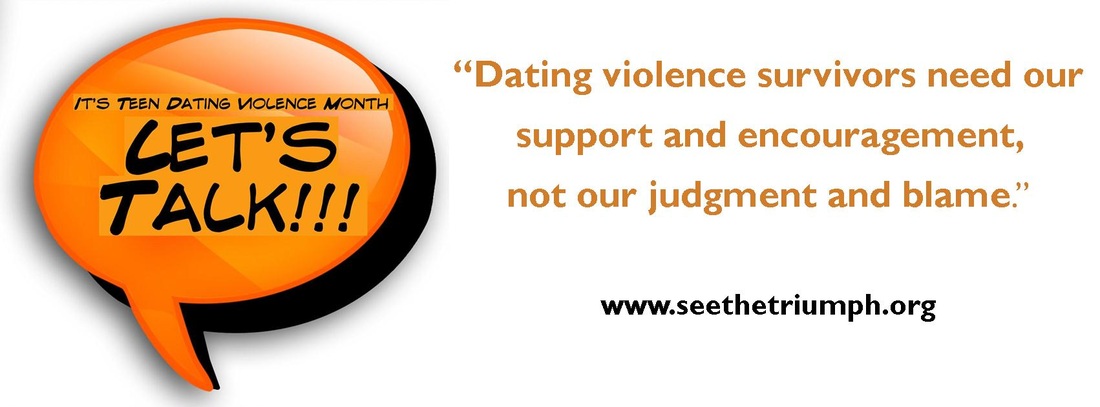
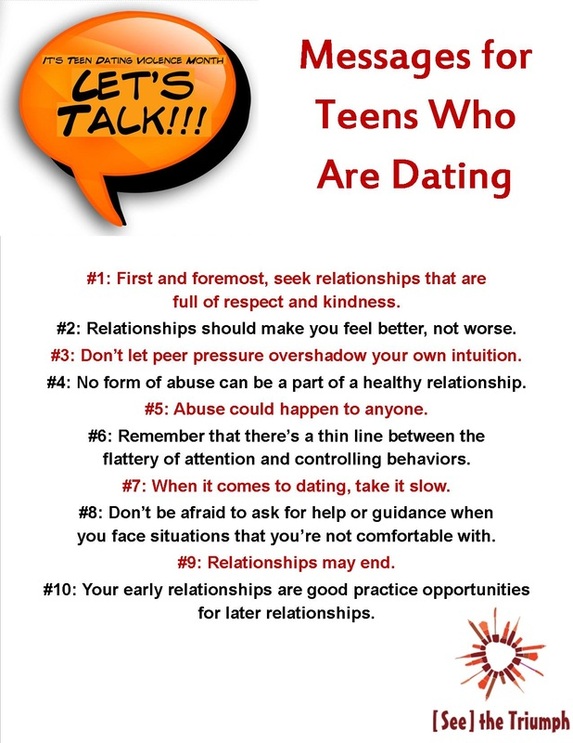
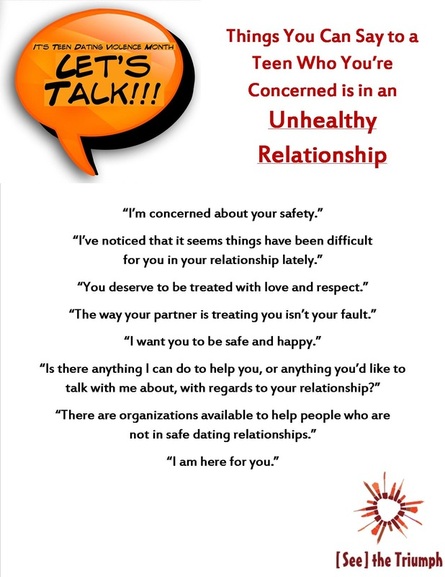
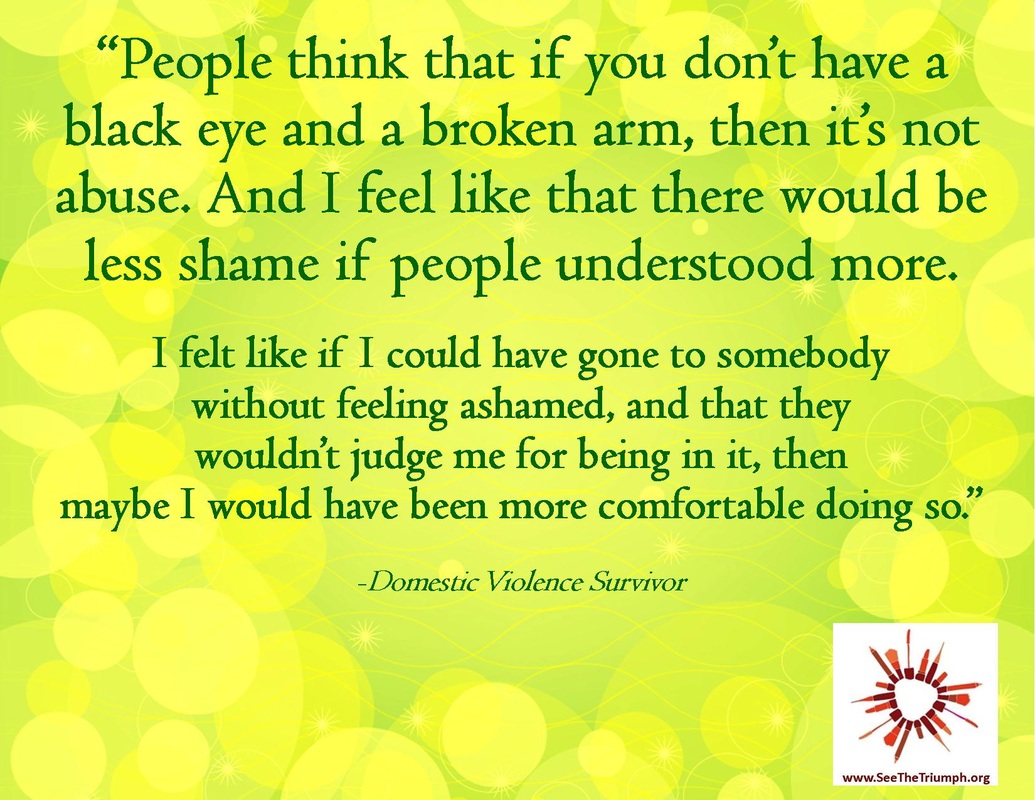
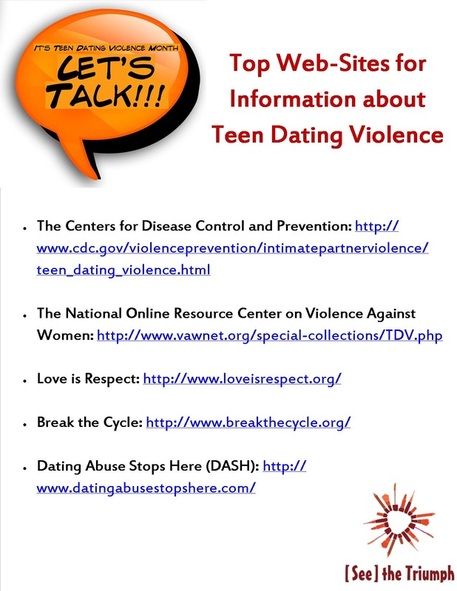
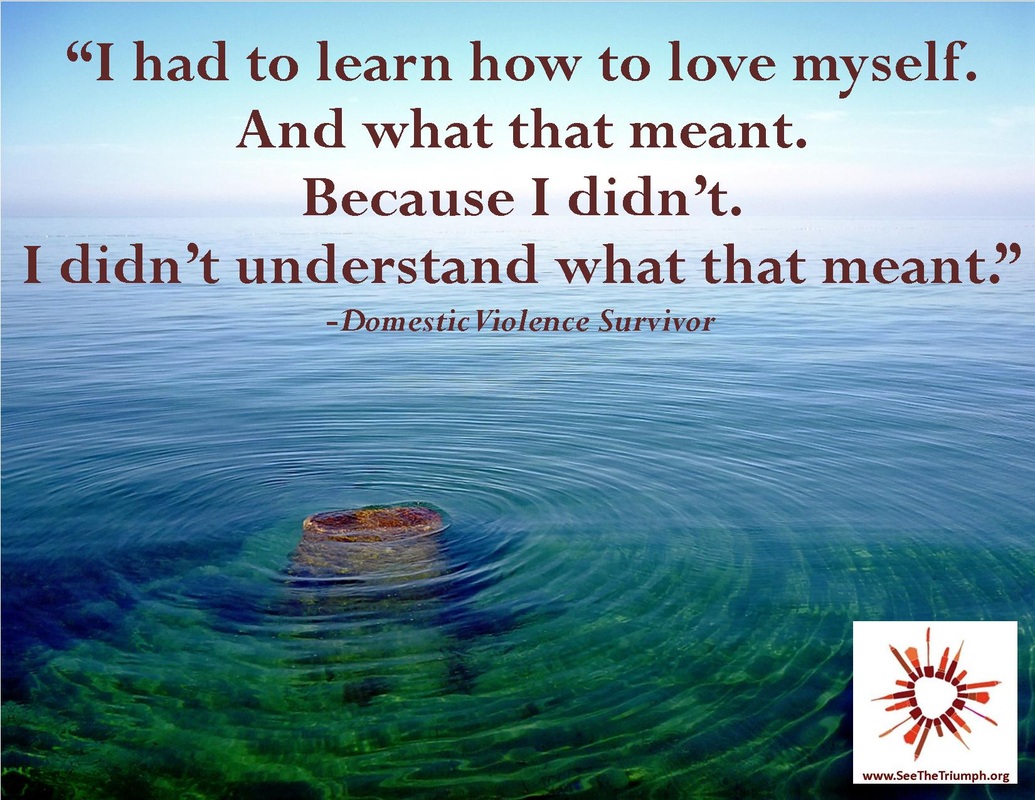
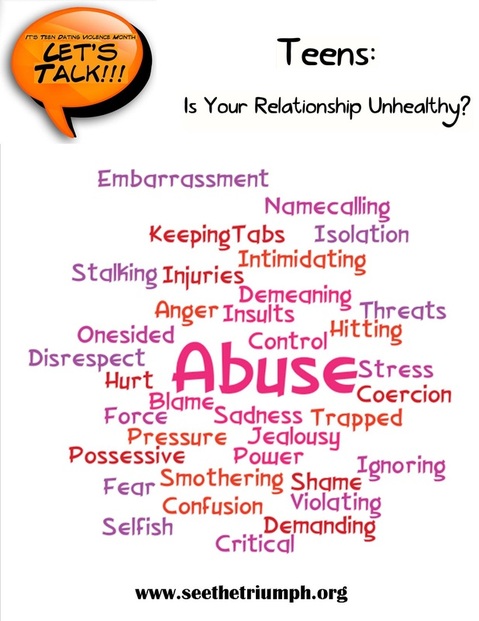
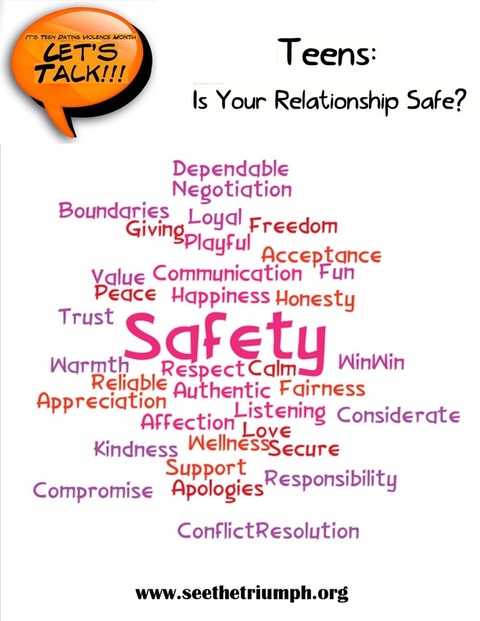
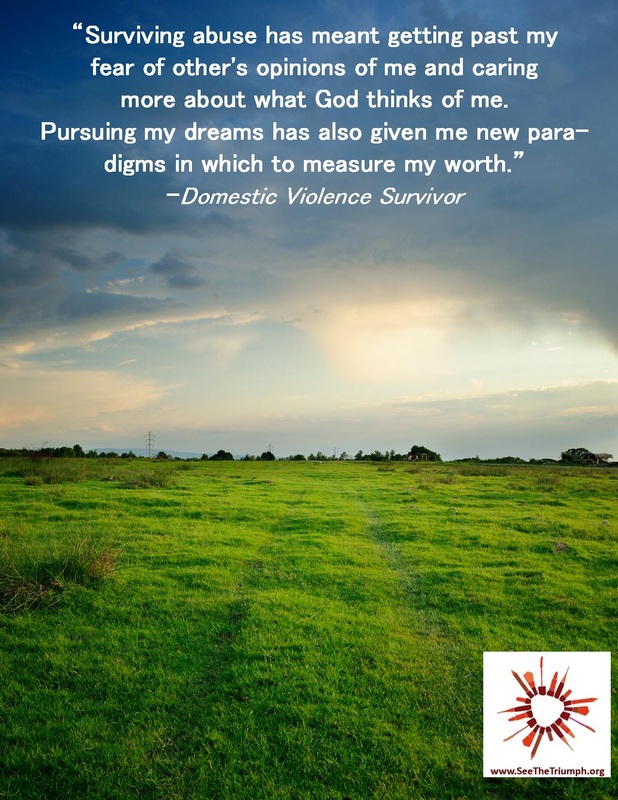
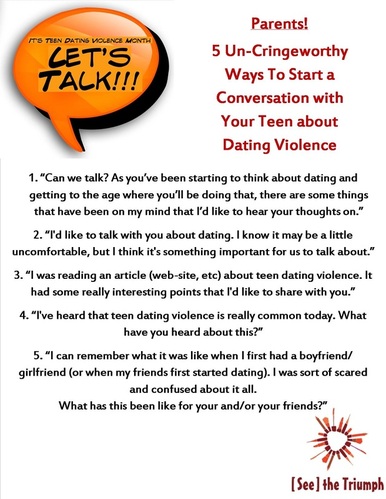
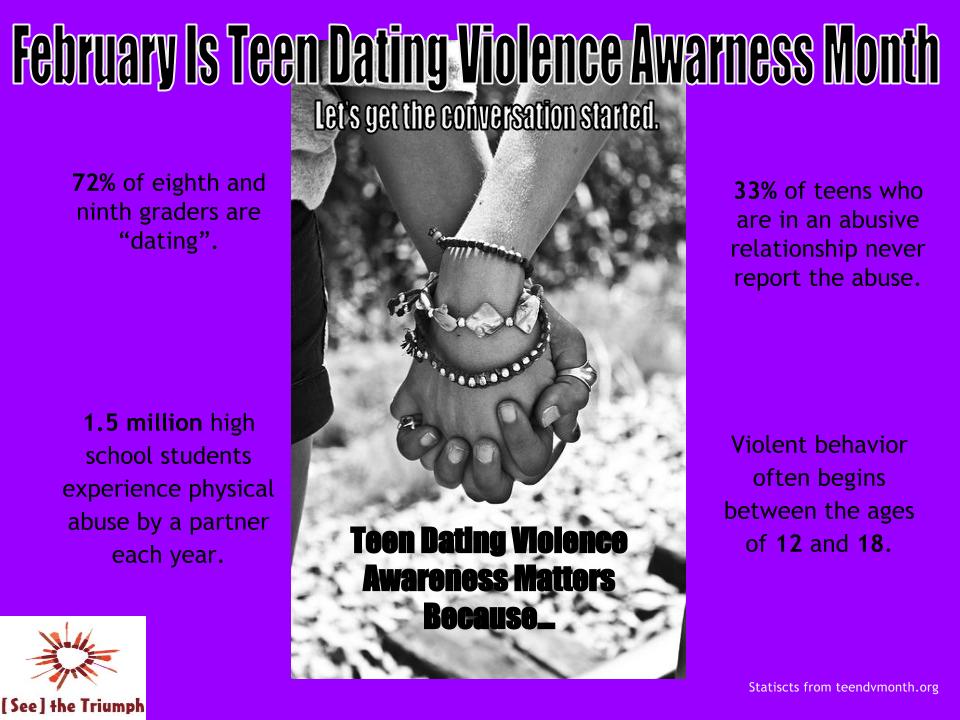
 RSS Feed
RSS Feed